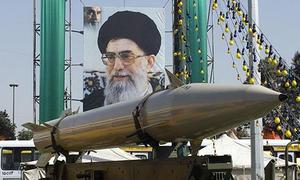Iran's bombWeekend nuke talks with Iran run aground
A weekend meeting in Istanbul between Iran and six world powers about the future of Iran’s nuclear weapons program ended in an impasse; Iran insisted that any talks should be preceded by the lifting of the UN sanctions on Iran — but the United States, Russia, China, Britain, France, and Germany were in lock step in their opposition to Iran’s proposed conditions; the group’s unanimity could enhance prospects for a broad international agreement on future sanctions or other punitive measures to force concessions from Iran in the future; the six powers offered Iran a revamped version of last year’s Tehran Research Reactor proposal, in which France and Russia agreed to provide Iran with much-needed fuel rods for a medical research reactor if Iran would part with a large chunk of its stockpile of enriched uranium; such a deal would have left Iran with less than the minimum amount of nuclear fuel needed to make a single atomic bomb

Iran is determined to be nuclear-capable // Source: cominganarchy.com
Diplomatic efforts to end the 8-year-old impasse over Iran’s nuclear program ran aground Saturday after Iranian officials refused to bargain with the United States and other world powers unless these leaders first agreed to conditions including an immediate halt to economic sanctions.
The standoff, played out over two days inside a picturesque palace on the shores of the Bosporus, ended with dueling diplomatic statements and deepening pessimism about prospects for solving one of the Obama administration’s most vexing security challenges.
There was no discussion of further talks in the near future.
“This is not the conclusion I had hoped for,” Catherine Ashton, the European Union’s foreign-policy chief, said after the talks ended shortly past noon.
She acknowledged that negotiators never came close to tackling the core issues, such as Iran’s uranium enrichment program, because of Iran’s insistence on concessions from the West.
“These preconditions are not a way to proceed,” Ashton said.
U.S. and European officials said, however, they were encouraged by the cohesion shown by the six countries on the other side of the negotiating table.
The Washington Post reports that those countries — the United States, Russia, China, Britain, France, and Germany — have often disagreed on Iran, but the group was in lock step in their opposition to Iran’s proposed conditions, according to U.S. and EU officials who participated in the talks.
The group’s unanimity could enhance prospects for a broad international agreement on future sanctions or other punitive measures to force concessions from Iran in the future, the officials said.
“The Iranians are tough negotiators, and their aim was to test for splits [among the six nations] and to see if they could extract concessions on their preconditions,” said a senior Obama administration official who participated in the meetings. “They left with a pretty clear impression of the unity of this group.”
In 2002 Iranian dissidents disclosed the existence of a massive uranium enrichment plant that Iran was secretly constructing. It was the first of a series of revelations that raised questions about Iran’s possible pursuit of a nuclear bomb.
Negotiations between Iran and the six world powers resumed last month in Geneva after a pause of more than a year. In those talks, Iran agreed to a second round of meetings in Istanbul, raising hopes that it might be ready to consider limits on its nuclear program.
Western diplomats arrived in Istanbul with a list of what they called “practical steps” that Iran could adopt to prove
